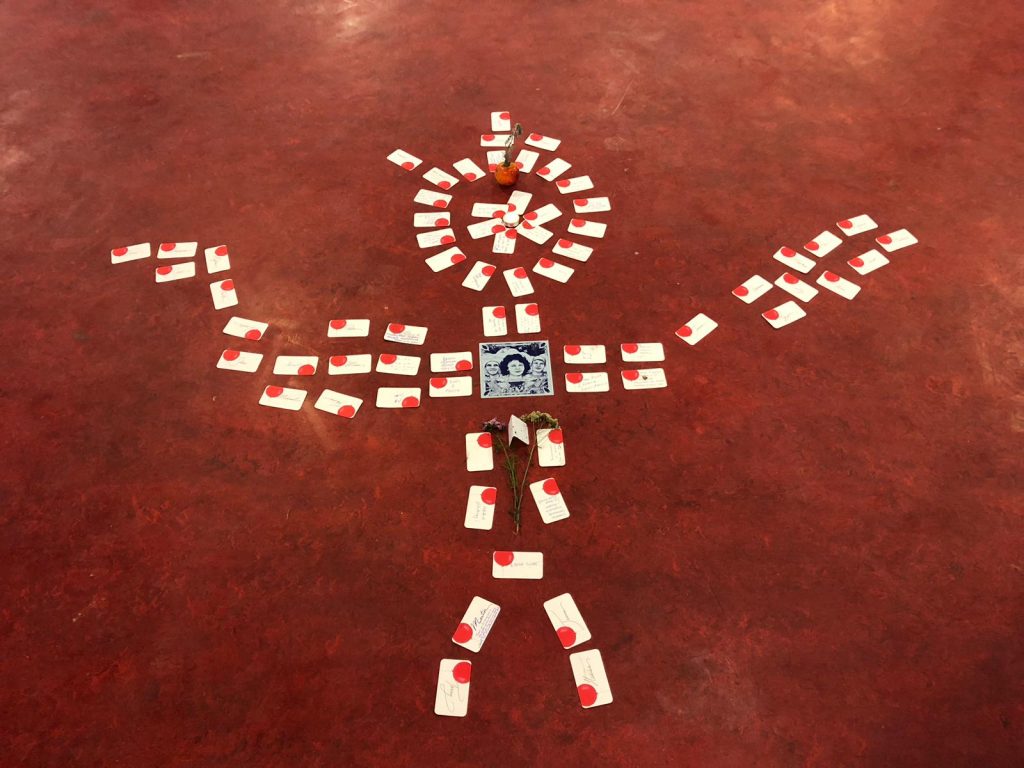In November 2018, the second EDGE’s Global Engagement Lab met for its inaugural meeting at La Bergerie de Villarceaux in France, generously hosted by Fondation Charles Léopold Mayer pour le Progrés de l’Homme.
Twenty-nine funders from around the world, joined by EDGE staff, GEL alumni advisors, and movement partners met to launch a six-month process aimed at understanding “How can we, the most recent GEL cohort, continue to push philanthropy toward strategies that lead to more equitable, regenerative systems“.
We would like to share with you a blog written by a GEL participant, Michael Kourabas, Associate Director for Grantmaking & Impact at UUSC. Michael tells us about what the GEL meant for him, and the expectations and hopes for the upcoming activities.
If you are interest in knowing more about the Global Engagement Lab, you can also read the report of the first cohort, or visit the dedicated space on the website.
 Reflections on GEL Two
Reflections on GEL Two
By Michael Kourabas
“Wait, you’re going where?,” a co-worker asks. “Paris,” I reply. Immediately seared by a pair of judgmental eyes, I quickly add, “Well, not quite. Somewhere outside of Paris. To an organic farm…” This clarification is, apparently, not helping my cause. Aiming to salvage some credibility, I mumble, “But we’re going to be talking about systems change…. And, I’ve heard the beds are really uncomfortable.”
***
I get the skepticism, so let’s dispense with some of the “superficial” details of the latest Global Engagement Lab (the “GEL”). Yes, the GEL is held amidst castles and giant, strangely furry cows, at the sublime La Bergerie retreat center, one-hour outside of Paris. There is a significant amount of wine available for purchase, a nightly campfire, and a magical device that cooks eggs to your specification. The lovely staff will accommodate pre-9 a.m. coffee requests (demands?), but guests are asked to please refrain from taking alcohol from behind the bar in the restaurant without first speaking to staff.
“I get it, you were in France with lots of wine,” you say. “But, how was the actual GEL experience?” “Transformative and ‘We’ll see,’” I say.
Let’s deal with each of those in turn.
It Was Transformative.
I don’t claim to speak for the entire GEL cohort but, personally, I struggle to think of a more meaningful professional experience. The “why” boils down to one thing: the people.
 More than anything, I came away from those four days in France feeling connected to many wonderful human beings. Perhaps that seems like the obvious result of prolonged exposure to the same group of passionate individuals; for me, someone who skews introvert and desperately needs personal time, it’s not something to be taken for granted.
More than anything, I came away from those four days in France feeling connected to many wonderful human beings. Perhaps that seems like the obvious result of prolonged exposure to the same group of passionate individuals; for me, someone who skews introvert and desperately needs personal time, it’s not something to be taken for granted.
Those connections are personal, sure – the product of some extremely late night (early morning) conversations, extended campfire time, and walks on the farm. But they’re also closely related to why we were all there in the first place (which, I swear, wasn’t about the wine! Stop suggesting that!): organizing philanthropy for systemic change.
As it turns out, “systemic change philanthropy” is complicated and maybe we’re not even sure what it is just yet! Again and again during the retreat, we were reminded of how systemic oppressions (racism, capitalism, patriarchy, anthropocentrism, extractivism, etc.) intersect, are mutually reinforcing, and how they demand responses that are just as complementary and intersectional. Surrounded by people from so many different philanthropies and backgrounds, all dedicated to figuring this stuff out, was sustaining and inspiring.
We also had the chance to hear from and connect with folks who are already putting theory into practice – to learn from each other what is and isn’t working, and how we can do better. I was so grateful to return to UUSC with concrete examples of how our organization can continue to push ourselves to deliver longer-term, more flexible support to our partners and movements; how we can more creatively shift power and return capital to communities; and how we can learn from systemic alternatives with long histories in Indigenous cultures.
We’ll See.
The real impact of this GEL, however, is unknown. It exists somewhere in the future, maybe after the second retreat and annual conference (hopefully) in Brazil, maybe long after that. The beauty is that it depends on us!
One of our exercises at the retreat was to spend some time visioning a post-GEL action project. How can we, the most recent GEL cohort, continue to push philanthropy toward strategies that lead to more equitable, regenerative systems? A big lesson for me is that the change we seek cannot be achieved in a vacuum. Just as we can’t uproot patriarchy without considering the role of capitalism, for example, our organizations cannot continue to work on “our own issues” while remaining ignorant of – or just plain ignoring – the rest of the philanthropic (or movement) ecosystem.
For those of us fortunate enough to participate in this second GEL, we have each other! We have been given an incredible opportunity for progress and growth. How will we use our shared experience to hold each other accountable and to push even harder for systemic change? Or, as one of my GEL compatriots put it, how will we continue to work together, “lead out of love, and FUCK SHIT UP”? The real measure of this GEL depends on how we answer those questions.

Leave a Reply